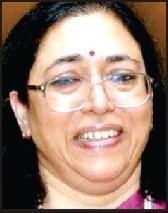Since I last shared snippets of my old lady life with readers, it’s been a month of charming and also sad events. While these happened at different times and in different places, the common factor was that they all related to books, a topic on which as everyone knows, I can natter on till the monsoons arrive.
I attended the book reading of my friend Dr. Latha Muthanna, who has produced a quaint and most enjoyable translation of her mother’s memoirs originally written in Kodava dialect. Very simply and honestly told, she let on to us that some of her huge family in Coorg were aghast at her frankness and questioned whether certain things needed to be mentioned? She however was quite firm about painting the whole picture and the result was “Lopamudra’s Daughter: Memoirs of a Kodava Lady.” It is the kind of book you’d like to have at your bedside, to calm your psyche after an overdose of thrillers. I tend to read thriller after thriller till something forces me to stop.
At the reading, while Latha was fielding questions from the audience, I was struck by the fact that doctors often make excellent writers. Offhand I can name at least three who have written best-selling novels — Abraham Verghese (Cutting for Stone), Robin Cook with a long list of thrillers, and Kalpana Swaminathan, a surgeon in Mumbai whose ‘Lalli’ series of murder and mayhem has become immensely popular. Despite their famously bad handwriting, doctors churn out pretty readable stuff, wouldn’t you say? And going back in history, can we forget Dr. Arthur Conan Doyle, creator of Sherlock Holmes?
A couple of weeks ago we were privileged to host Aroon Raman, bestselling author, who talked about his latest book ‘The Treasure of Kafur.’ The select audience at the Sankalp Central Park Library was treated to a splendid history lesson complete with slides and a riveting commentary on the life and times of medieval India and the reign of Akbar, when the action of the story takes place. While there are not many Indian authors today who deal in magic realism [defined by Wikipedia as “what happens when a highly detailed, realistic setting is invaded by something too strange to believe”], Raman has no qualms about introducing talking animals, magic healers and such, to create a pretty marvelous tale of adventure and romance. I definitely will be waiting for a sequel, as the story has ended at a critical juncture.
By now many things nice and not so nice have been said about the late Khushwant Singh, man of letters, historian, celebrity sardar, a man whom you either adored or viewed with dislike. I thought he was great. He never minced words, his vision was crystal clear and whatever his political views may have been, he was a captivating writer. It takes courage in India to write about taboo topics, and he just went right ahead, never giving a damn about what critics thought, always with a wicked gleam of irreverence in his attitude. Khushwant Singh’s readership is a broad spectrum, from those who just pick up his compilations of jokes to read on journeys to those who read his collections of short stories and novels. On the serious side, his history of the Sikhs and his biography of Maharaja Ranjit Singh are profound works.
A friend of ours from Muscat had sat in a goods train on piles of gunny sacks, and travelled from Jalandar to Lahore as a refugee in 1947 when she was eight years old. Spending the rest of her life in Lahore, she yearned always to visit Jalandar once again but now in her seventies and confined to her wheelchair she felt it was no longer possible. We attended the launch of her autobiography organised by her son who lived in Muscat. At the launch she requested us to get her a copy of Khushwant Singh’s Train to Pakistan which she had not found anywhere in the bookshops in Lahore. So we did get her a copy much to her delight and she read it with great emotion, as though her own life was being described.
So there we have it — the new authors who will go a long way; and the sadness of the passing of a literary giant who left his mark on Indian writing for always. It so happens that I have with me some books written by modern authors like Anthony Horowitz and Sebastian Faulks. They are based on characters we know and have loved over the decades. While Horowitz has written a Sherlock Holmes mystery called The House of Silk, Faulks has written Jeeves and The Wedding Bells, bringing back to life the inimitable creation of PG Wodehouse. Can the masters be successfully imitated? Are the stories the same in quality? You might be surprised.
[e-mail:raolalitha@hotmail.com]
source: http://www.starofmysore.com / Star of Mysore / Home> Feature Articles / April 20th, 2014


